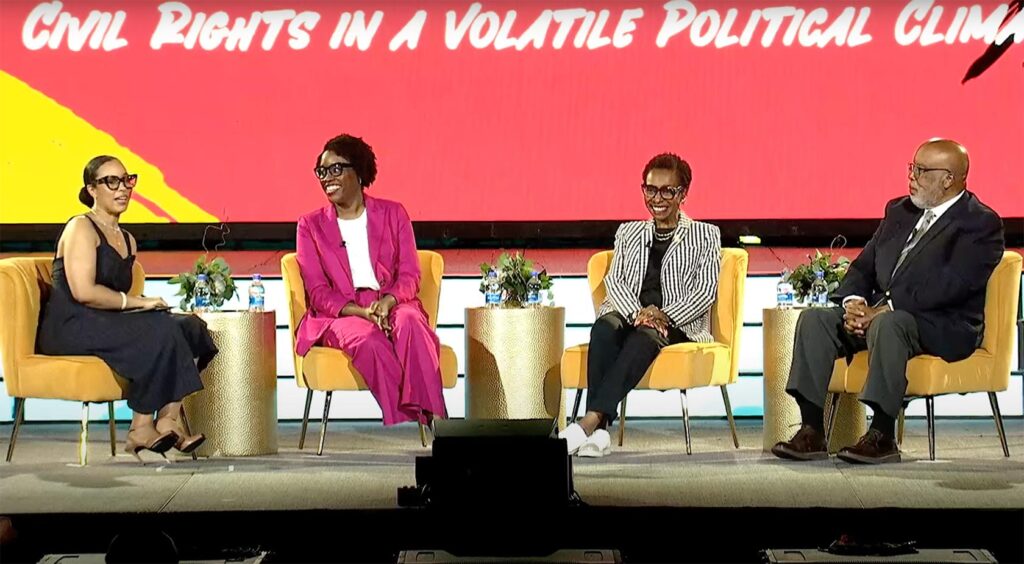
Under the theme “The Fierce Urgency of Now,” the NAACP opened its 116th annual convention on July 12, with the intent of both safeguarding and advancing the civil rights gains and social justice efforts under ruthless federal attack.
Convening in Charlotte, North Carolina, through July 16, the national gathering prepared to fight on many fronts in keeping with its historical mission to bolster the agency of Black communities in the United States.
The future of democracy is among the convention’s top priorities.
“We are steeling the organization for the future,” said Dominic K. Hawkins, the NAACP’s vice president of communications. “We are mobilizing, gathering, strategizing moving forward. That’s one of the main purposes of the convention.”
The convention theme is a quotation by Dr. Martin Luther King Jr. The civil rights leader used it in what has come to be called his “I Have a Dream” speech, which he delivered on August 28, 1963, at the March on Washington for Jobs and Freedom in front of the Lincoln Memorial. It was a statement he would use again, notably in his 1967 book, “Where Do We Go From Here: Chaos or Community.” King wrote: “We are now faced with the fact that tomorrow is today. We are confronted with the fierce urgency of now. In this unfolding conundrum of life and history, there is such a thing as being too late.”
The NAACP’s route of strategic immediacy is in part planned to counter the policy rollbacks and changes the administration of President Donald J. Trump has wrought since he began his second term in January. With vast and dire changes to who will qualify for Medicaid, to education funding, to protecting economic and social equity for all, many working- and middle-class Americans will be shut out of the country’s bounty to which they contribute.
“We are going to see a major change in what government is,” Hawkins said. He pointed out that Trump is using “authoritarian tactics, strongman tactics, to bend the American public to his will.”
Yet, while the NAACP is experienced in combating such conditions, he said, what we are seeing now has never been quite like this. “There has always been resistance to Black progress,” he said, citing the 1921 race massacre in the Greenwood district of Tulsa, Oklahoma, a prosperous community known as “The Black Wall Street.” There has always been a Black response to incidents of white backlash, and it has often been creative, Hawkins said.
The NAACP Convention has always been a place for collaborative action. It brings together change-makers, thought leaders, entrepreneurs, academics, entertainers and social influencers for networking and idea exchanging on issues that affect Black America. Discussions, delegate debates, sessions and special events generate action plans. Convention delegates vote on resolutions that will inform the organization’s strategies for the coming year, Hawkins said.
Among these talks will be ways of expanding Black-owned businesses, protecting voting rights, countering efforts to dismantle government agencies and fighting authoritarianism and fascism, he said.
For the first time in its history, the NAACP declined to invite the sitting president. Nor was Vice President JD Vance asked to attend. The organization invited Trump to its conventions during his first term in office, 2017-2021, which he turned down.
According to NPR, a White House spokesman issued a statement saying, “The NAACP isn’t advancing anything but hate and division, while the President is focused on uniting our country, improving our economy, securing our borders, and establishing peace across the globe. This is the same vision for America that a record number of Black Americans supported in the resounding reelection of President Trump.”
Hawkins pointed out that the NAACP is not about advocating any political viewpoints; it is a nonpartisan organization that works for the benefit of “all Americans, not just Black Americans.” There are ways in which the public can play a role in the NAACP’s efforts, he said. These include voting, getting the word out, people sharing what they hear and joining the organization.
It has been three decades since the NAACP held its annual convention in Charlotte. In a statement released in June, the organization stated that this year’s gathering comes “at a pivotal moment, as marginalized communities face escalating political attacks, financial equity remains elusive, and vital federal programs hang in the balance. During the convention, the NAACP is bringing together its vast network to confront these challenges head-on. Programming will explore the profound impact of Black culture on DEI, education, and justice, while also serving as a call to action.”
This year’s convention offerings feature a health summit and the return of The Hub, a 50,000-square-foot community space with businesses, resources, author signings and programming to engage attendees in the main halls between events. The Hub includes a job and career fair, sports and games, and a college summit and career fair, among other offerings.
For the first time, the convention will offer the NAACP’s Hollywood Bureau’s “Be in the Biz” series, which is designed to help underrepresented communities enter the entertainment industry. This initiative brings industry knowledge and opportunity to emerging content creators who don’t have access to Hollywood networks, executives, or resources. This year’s lineup features influential Hollywood insiders, including producers, network executives, filmmakers and creative leaders.
The NAACP’s achievement program ACT SO — Afro-Academic, Cultural, Technological and Scientific Olympics — will be highlighted during the convention as well, with winners of local competitions from around the country participating in the final competition and awards ceremony. ACT SO is a nationwide, yearlong achievement program designed to recruit, stimulate and encourage high academic and cultural achievement among African American high school students.







Leave a Reply
You must be logged in to post a comment.